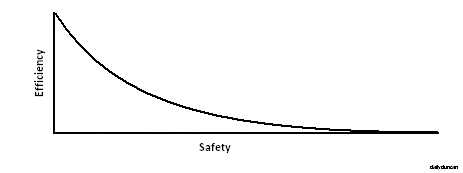In the year 2000 there were over six million motor vehicle accidents in the United States, resulting in 41,945 human fatalities. In that same year an estimated 247,000 deer were maimed or killed in motor vehicle collisions, and it’s likely that other species, such as birds, suffered even greater losses. Driving is undeniably dangerous.
Many of these accidents were likely caused by intoxication or carelessness, but piloting a 1,000 kg metal box at speeds exceeding 100 km/h is inherently hazardous. In an effort to mitigate the number of vehicle collisions, some groups are lobbying for reduced speed limits, especially in residential and high-traffic areas. Their premise that slower vehicles will produce fewer collisions couldn’t be less inaccurate.
It’s obvious to most that slower vehicles are safer, since the force of impact is diminished and the window for driver reaction is expanded. Objects with no velocity are the easiest to avoid since they rarely crash into things. Unfortunately, getting motorists to slow down is not as simple as a mere adjustment in signage.
A report by the Turner-Fairbank Highway Research Center concluded that neither lowering nor raising speed limits by up to 24 km/h had a significant effect on motorist speed. The report’s conclusion states, “…motorists do not alter their speed to conform to speed limits they perceive as unreasonable for prevailing conditions.” But even if drivers did obey the new speed limits, a more challenging question must be answered: how many lives are we willing to sacrifice?
Most groups advocating lower speed limits are requesting that they be reduced by 10 or 20 km/h, but slower vehicles would still produce some collisions, injuries and deaths. So how many fatalities are we willing to accept as a natural consequence? This is a very difficult question to answer, and it applies to many areas beyond that of motor vehicles.
In every industry there are deaths, injuries or accidents of some kind. Rules are created, precautions are taken and laws are passed to reduce these incidents, but they aren’t really aimed at reducing the number of incidents to zero. This is because safety is inversely proportional to efficiency.
Imposing health and safety practices on an industry will inevitably make it less efficient. Conversely, an industry operating without any concern for safety would likely be very efficient, that is, until its workforce is deceased or debilitated.
Some concerned individuals feel a moral obligation to avoid purchasing products from companies that exploit people, animals or the environment, but again, how much is too much? Let’s look at some examples of absolute positions often taken on subjects that are not absolute.
Many people hold a negative view of oil companies because of the environmental damage they inflict, so they ride a bicycle or take public transit. But almost all the products they buy are transported by fuel-burning freight and constructed with oil-based synthetic materials.
Some individuals choose not to eat meat so that animals might be spared unnatural suffering and an early death, but many animals are killed by farming machinery during the harvest of crops and even more are displaced by agricultural properties. And, of course, they are not concerned with the number of insects that are crushed beneath their feet every day, since bugs do not hold a high animal value.
The idea that moral issues are not as dry and cut as we might like can make us feel overwhelmed and impotent. When we realize that no person, organization or action is purely good or evil, we can succumb to what is known as the grey escape – an apathetic exit to a moral predicament. The grey escape is the perception that when an issue is complex or its answer is not easily reached, the solution must be either nonexistent or unworthy of investigation. People who subscribe to this line of thinking are often too concerned with entertainment, success and pleasure to bother the moral and abstract. “Because the matter is grey,” they say, “it deserves not the time of day.”
Grey things are the most important.
